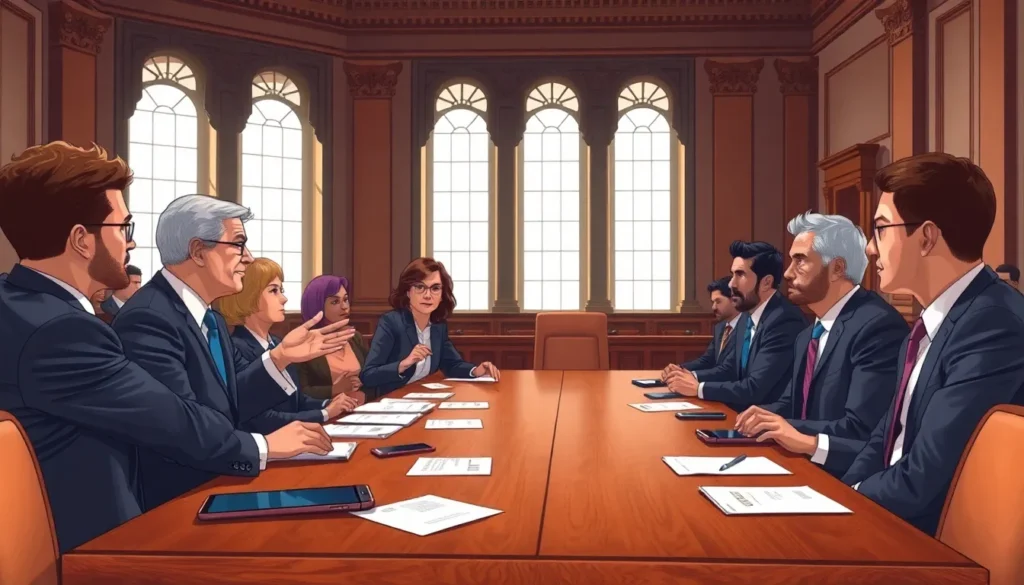In a world where politicians often seem more interested in their next selfie than in solving real problems, individual citizens hold the power to turn the tide. It’s not just about voting every four years; it’s about becoming the loudest voice in the room, even if that room is just a local coffee shop. When citizens band together, they can create a chorus that even the most tone-deaf lawmakers can’t ignore.
Whether it’s rallying friends over social media or crafting a killer letter to their representatives, individuals can shape public policy in ways that make even the most seasoned lobbyists sweat. After all, who knew that a simple tweet or a well-timed hashtag could wield such influence? By embracing their inner activist, citizens can ensure their concerns aren’t just whispers in the wind but a clarion call for change.
Table of Contents
ToggleParticipating in Local Government
Active participation in local government offers citizens a vital avenue to influence public policy. Various methods enhance this engagement and improve community representation.
Attending Town Hall Meetings
Town hall meetings present a direct platform for citizens to voice their opinions. Individuals gather to discuss local issues, propose changes, and ask questions. Participation fosters transparency and accountability among officials. Listening to concerns helps local representatives understand community needs more thoroughly. Bringing specific examples or data reinforces arguments during discussions. Active involvement in these meetings encourages constructive dialogue between constituents and elected officials.
Engaging with Local Officials
Citizens can engage with local officials through direct communication channels. Emails and phone calls serve as efficient means to express concerns or ask for assistance. Setting up one-on-one meetings provides a personalized approach to advocacy. Discussing specific policies and their impacts allows citizens to make their points more relatable. Building relationships with officials leads to stronger advocacy efforts. Consistent engagement ensures public interests remain a priority in policy discussions.
Utilizing Social Media Platforms
Social media platforms serve as powerful tools for citizens seeking to influence public policy. They allow users to communicate ideas quickly and widely.
Campaigning for Issues
Citizens can use social media to campaign for specific issues. Platforms like Twitter and Facebook offer space for sharing petitions and mobilizing supporters. Organizing hashtag campaigns can raise awareness on pressing topics. Engaging in conversations through comments or direct messages can strengthen advocacy efforts. By creating shareable content, they can amplify their messages and reach larger audiences. Utilizing live streams for discussions can draw attention to important matters. Through collaborations with influencers, individuals can enhance their impact further. Tracking analytics can help refine strategies and measure success.
Building Online Communities
Online communities establish connections among like-minded individuals. They provide safe spaces for discussing public policy concerns. Creating groups or forums fosters dialogue and encourages collaboration on initiatives. Members can share resources and offer support for one another’s efforts. Regular engagement within these groups keeps the momentum going. Addressing group goals collectively can lead to real change. Hosting virtual events can energize communities and attract wider participation. With a solid online presence, citizens can create a buzz around specific issues involving local or national significance. Thus, social media becomes a critical avenue for citizens to unite and influence policy.
Mobilizing Grassroots Movements
Grassroots movements empower citizens to influence public policy effectively. Through collective action, individuals can amplify their voices and drive change.
Organizing Community Events
Community events serve as platforms for citizens to express their concerns and mobilize support. Workshops and town halls draw attention to local issues, inviting diverse perspectives. Engaging in activities like clean-up days or advocacy rallies fosters a sense of solidarity. Participants can share their experiences and collaborate on policy solutions. Demonstrating unity during these events strengthens community ties and enhances visibility of important causes.
Partnering with Local Organizations
Local organizations play a crucial role in grassroots mobilization. Collaborating with nonprofits or advocacy groups increases resources and reach. They often have established networks and expertise that amplify citizens’ efforts. Partners can help organize events, provide training, and share information on policy issues. By working together, individuals leverage the organization’s credibility while broadening the audience for advocacy campaigns. Collective efforts enhance the impact on policy discussions and promote community engagement.
Advocating for Legislative Change
Influencing public policy through legislative change involves several effective strategies that individuals can adopt. Engaging directly with lawmakers remains a powerful avenue for advocacy.
Writing Letters to Representatives
Crafting letters to representatives provides citizens with a direct line of communication to decision-makers. Each letter should include a clear message highlighting specific issues or proposed legislation. By clearly stating opinions, individuals can emphasize the importance of their concerns. Personal stories often resonate more deeply and can illustrate the potential impacts of policies. Tailoring letters to resonate with a representative’s priorities enhances the likelihood of a response. Consistent correspondence reinforces the urgency of issues, ensuring that voices are heard amidst legislative discussions.
Supporting Advocacy Groups
Supporting advocacy groups fosters collective power in pushing for legislative change. These organizations often have established networks and extensive experience in lobbying for policy reforms. Joining efforts with them amplifies individual voices, creating a more substantial impact. Contributing time, resources, or funds aids their missions and broadens outreach efforts. Participation in campaigns organized by these groups can strengthen community ties and enhance advocacy. Engaging in events organized by advocacy organizations provides platforms for expressing concerns and sharing information on pressing issues.
Individual citizens possess the power to shape public policy through active engagement and collective action. By participating in local government and utilizing social media, they can amplify their voices and connect with others who share their concerns. Grassroots movements foster community solidarity and drive meaningful change, while direct communication with lawmakers ensures that citizens’ needs are represented.
The synergy between personal advocacy and organized efforts creates a robust platform for influencing policy discussions. As citizens unite and collaborate with local organizations, their impact grows exponentially. Ultimately, it’s this persistent dedication to involvement that can transform public policy and create a more responsive political landscape.


